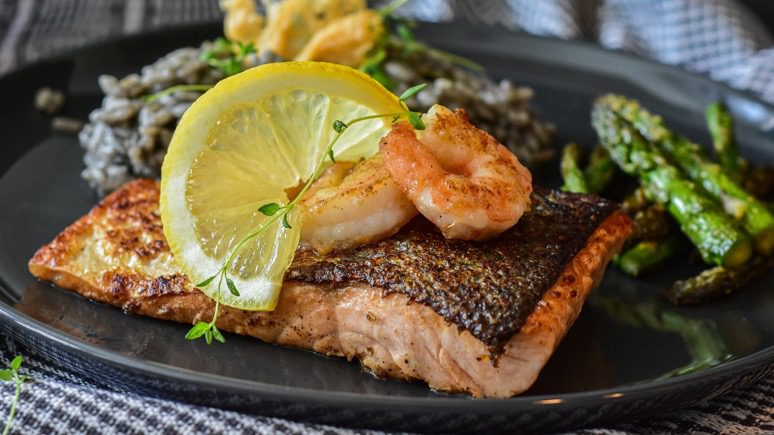Introduction
Fish is one of the healthiest foods on the Earth. It provides our body with essential nutrients such as quality protein, vitamin D, iodine, omega-3 fatty acids, and others. The Dietary Guidelines for Americans recommend eating eight to ten ounces of seafood per week to meet body requirements and promote health benefits.
The pescatarian diet is a type of vegetarianism that excludes poultry and meat but allows the consumption of eggs, dairy, fish, and seafood. Compared with other types of vegetarian diets, this one allows more protein options to fulfill your daily requirements.
A well-balanced pescatarian diet has a beneficial impact on the human body. People practicing this nutritional approach tend to be thinner and have a lower risk of type 2 diabetes, heart diseases, and cancers that affect the colon and rectum. In addition, all types of vegetarian diets are considered more environmentally friendly.
Key points
People practicing the pescatarian nutritional approach exclude poultry and meat from their diets. Instead, they eat a primarily plant-based diet with the addition of fish and seafood. Some pescatarians also add eggs and dairy products. Build your diet with the following food groups:
- vegetables
- fruits
- nuts and seeds
- beans and legumes
- grains
- fish and shellfish
- dairy products
- eggs
It is essential to remember that you need to eat a well-balanced diet to experience all benefits of the pescatarian diet. Many plant-based processed foods exist and are full of sugars, starches, saturated fats, and salt. Try choosing primarily whole foods to nourish your body with essential macro and micronutrients.
Contraindications
Pregnant and breastfeeding women and children under age five should consult a registered dietitian before trying a pescatarian diet. It is recommended that pregnant women avoid raw fish and be precautious about mercury levels in the fish. In addition, breastfeeding women or those having small children should also be cautious about mercury.
Fish high in mercury include shark, swordfish, mackerel, tilefish, orange roughy, marlin, and bigeye tuna.
How to avoid possible nutritional deficiencies
A well-balanced pescatarian diet is a healthy option that can provide you with essential nutrients. However, some people, especially those excluding eggs and dairy products, may develop nutritional deficiencies, including calcium, vitamin B-12, zinc, and iodine. To prevent them, add the following foods to your diet:
- calcium: cheese, yogurt, almonds, seeds (chia, sesame, and poppy seeds), canned salmon, sardines, beans, lentils, leafy greens, etc.
- vitamin B-12: calms, sardines, tuna, eggs, fortified nutritional yeast, milk, dairy products, fortified foods;
- zinc: shellfish, legumes, cashews, seeds (pumpkin, hemp, sesame, and squash seeds), eggs, dairy products, quinoa, oats, etc.
- iodine: seaweed, cod, canned tuna, iodized table salt, dairy products, shrimps, eggs, prunes, lima beans.
An alternative way of getting these nutrients is by taking supplements. Consult the doctor or nutritionist about the exact supplements you may need.
Tips on improving your dieting experience
Many people are concerned about the mercury potentially stored in fish. Mercury is a chemical element that can cause severe health issues in humans upon exposure. Some fish can accumulate mercury in their muscles. The consumption of such fish can put people at risk of mercury poisoning.
Luckily, not all fish is equally likely to accumulate mercury. Try to limit the consumption of sharks, fresh or frozen tuna, marlin, king mackerel, tilefish, swordfish, escolar, and orange roughy. It is worth mentioning that you don’t need to eliminate listed fish species from your diet completely. However, be cautious about the amount.
Interestingly, canned light tuna is considered a safe option. This type of tuna is made of younger and smaller fish with much lower levels of mercury compared to fresh or frozen tuna. Notably, canned albacore tuna (also known as canned white tuna) is not considered a safe option.
Specially cautious about mercury in fish should be women who are or plan to get pregnant, breastfeeding women, and children. These people are at higher risk because mercury poisoning affects them more severely. It is because fetuses and young children have weaker tolerance toward mercury exposure.
Safe seafood options include canned light tuna, shrimps, pollock, salmon, catfish, clam, haddock, sardines, etc.
Conclusions
A pescatarian diet can be a healthy nutritional approach if well-balanced. In addition, this type of vegetarian diet is more environmentally friendly in comparison with a regular animal-based diet. At the same time, the pescatarian diet allows for more flexibility and protein options.
However, it is essential to be cautious about mercury levels in some fish to avoid adverse health effects.














Leave a Reply
You must be logged in to post a comment.